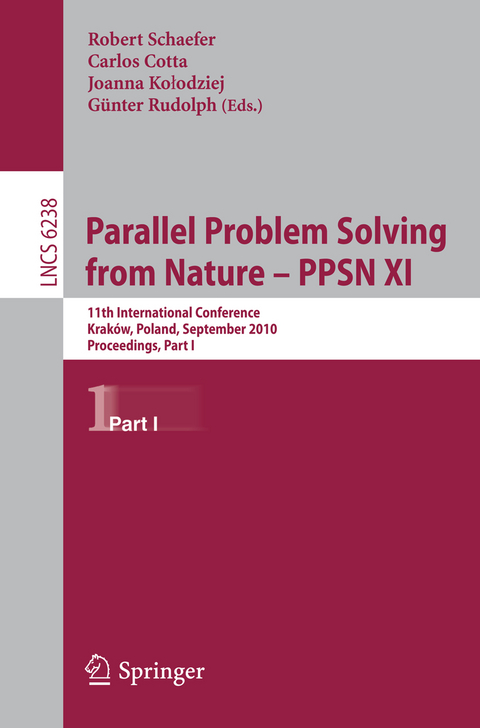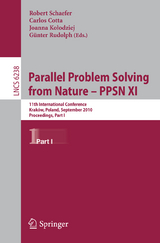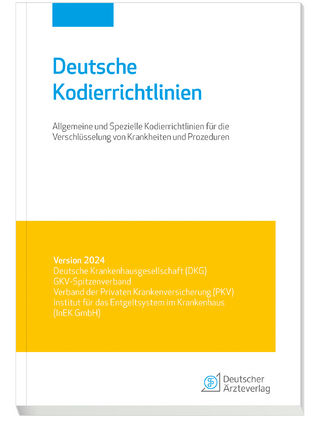Parallel Problem Solving from Nature, PPSN XI
Springer Berlin (Verlag)
978-3-642-15843-8 (ISBN)
Theory of Evolutionary Computing (I).- Optimal Fixed and Adaptive Mutation Rates for the LeadingOnes Problem.- Mirrored Sampling and Sequential Selection for Evolution Strategies.- Optimisation and Generalisation: Footprints in Instance Space.- Adaptive Drift Analysis.- Optimizing Monotone Functions Can Be Difficult.- Log-Linear Convergence of the Scale-Invariant (?/? w ,?)-ES and Optimal ? for Intermediate Recombination for Large Population Sizes.- Exploiting Overlap When Searching for Robust Optima.- Benchmarking Evolutionary Algorithms: Towards Exploratory Landscape Analysis.- One-Point Geometric Crossover.- When Does Dependency Modelling Help? Using a Randomized Landscape Generator to Compare Algorithms in Terms of Problem Structure.- First-Improvement vs. Best-Improvement Local Optima Networks of NK Landscapes.- Differential Mutation Based on Population Covariance Matrix.- General Lower Bounds for the Running Time of Evolutionary Algorithms.- A Binary Encoding Supporting Both Mutation and Recombination.- Towards Analyzing Recombination Operators in Evolutionary Search.- Theory of Evolutionary Computing (II).- Bidirectional Relation between CMA Evolution Strategies and Natural Evolution Strategies.- A Fine-Grained View of GP Locality with Binary Decision Diagrams as Ant Phenotypes.- Drift Analysis with Tail Bounds.- More Effective Crossover Operators for the All-Pairs Shortest Path Problem.- Comparison-Based Adaptive Strategy Selection with Bandits in Differential Evolution.- Fixed Parameter Evolutionary Algorithms and Maximum Leaf Spanning Trees: A Matter of Mutation.- An Archive Maintenance Scheme for Finding Robust Solutions.- Experimental Supplements to the Theoretical Analysis of Migration in the Island Model.- General Scheme for Analyzing RunningTimes of Parallel Evolutionary Algorithms.- Negative Drift in Populations.- Log(?) Modifications for Optimal Parallelism.- The Linkage Tree Genetic Algorithm.- An Analysis of the XOR Dynamic Problem Generator Based on the Dynamical System.- The Role of Degenerate Robustness in the Evolvability of Multi-agent Systems in Dynamic Environments.- Machine Learning, Classifier Systems, Image Processing.- Evolutionary Learning of Technical Trading Rules without Data-Mining Bias.- Using Computational Intelligence to Identify Performance Bottlenecks in a Computer System.- Selecting Small Audio Feature Sets in Music Classification by Means of Asymmetric Mutation.- Globally Induced Model Trees: An Evolutionary Approach.- Open-Ended Evolutionary Robotics: An Information Theoretic Approach.- A Novel Similarity-Based Crossover for Artificial Neural Network Evolution.- Indirect Encoding of Neural Networks for Scalable Go.- Comparison-Based Optimizers Need Comparison-Based Surrogates.- A Cooperative Coevolutionary Approach to Partitional Clustering.- Feature Selection for Multi-purpose Predictive Models: A Many-Objective Task.- Incorporating Domain Knowledge into Evolutionary Computing for Discovering Gene-Gene Interaction.- The Application of Pittsburgh-Style Learning Classifier Systems to Address Genetic Heterogeneity and Epistasis in Association Studies.- Threshold Selection, Mitosis and Dual Mutation in Cooperative Co-evolution: Application to Medical 3D Tomography.- Comparative Analysis of Search and Score Metaheuristics for Bayesian Network Structure Learning Using Node Juxtaposition Distributions.- Analyzing the Credit Default Swap Market Using Cartesian Genetic Programming.- Memetic Algorithms, Hybridized Techniques, Meta and Hyperheurisics.- A Memetic CooperativeOptimization Schema and Its Application to the Tool Switching Problem.- Ownership and Trade in Spatial Evolutionary Memetic Games.- A Hyper-Heuristic Approach to Strip Packing Problems.- Asymptotic Analysis of Computational Multi-Agent Systems.- Path-Guided Mutation for Stochastic Pareto Local Search Algorithms.- Scheduling English Football Fixtures over the Holiday Period Using Hyper-heuristics.- Graph Clustering Based Model Building.- How to Choose Solutions for Local Search in Multiobjective Combinatorial Memetic Algorithms.- Secure and Task Abortion Aware GA-Based Hybrid Metaheuristics for Grid Scheduling.- A Memetic Algorithm for the Pickup and Delivery Problem with Time Windows Using Selective Route Exchange Crossover.- Ant Based Hyper Heuristics with Space Reduction: A Case Study of the p-Median Problem.- A Study of Multi-parent Crossover Operators in a Memetic Algorithm.- A Hybrid Genetic Algorithm for the Traveling Salesman Problem Using Generalized Partition Crossover.- A Memetic Algorithm with Non Gradient-Based Local Search Assisted by a Meta-model.- Multiobjective Optimization, Theoretical Aspects.- Theoretically Investigating Optimal ?-Distributions for the Hypervolume Indicator: First Results for Three Objectives.- Convergence Rates of (1+1) Evolutionary Multiobjective Optimization Algorithms.- Tight Bounds for the Approximation Ratio of the Hypervolume Indicator.- Evolutionary Multiobjective Optimization Algorithm as a Markov System.- A Natural Evolution Strategy for Multi-objective Optimization.- Solving Multiobjective Optimization Problem by Constraint Optimization.- Enhancing Diversity for Average Ranking Method in Evolutionary Many-Objective Optimization.- Objective Space Partitioning Using Conflict Information for Many-Objective Optimization.- HowCrossover Speeds Up Evolutionary Algorithms for the Multi-criteria All-Pairs-Shortest-Path Problem.- Path Relinking on Many-Objective NK-Landscapes.- In Search of Equitable Solutions Using Multi-objective Evolutionary Algorithms.- Stopping Criteria for Genetic Algorithms with Application to Multiobjective Optimization.- Defining and Optimizing Indicator-Based Diversity Measures in Multiobjective Search.- On Expected-Improvement Criteria for Model-based Multi-objective Optimization.- Parameter Tuning Boosts Performance of Variation Operators in Multiobjective Optimization.
| Erscheint lt. Verlag | 3.9.2010 |
|---|---|
| Reihe/Serie | Lecture Notes in Computer Science | Theoretical Computer Science and General Issues |
| Zusatzinfo | XXI, 742 p. 211 illus. |
| Verlagsort | Berlin |
| Sprache | englisch |
| Gewicht | 1065 g |
| Themenwelt | Informatik ► Weitere Themen ► Bioinformatik |
| Naturwissenschaften ► Biologie | |
| Schlagworte | Algorithm analysis and problem complexity • algorithms • artificial ant systems • artificial immune systems • Artificial Life • Data Mining • emergent behaviours • Evolution • evolutionary algorithm • evolutionary computation • Genetic algorithms • Image Processing • Intelligence • learning • machine learning • Modeling • molecular computation • multi-agent system • Multi-Objective Optimization • Natural Computing • Problem Solving • Quantum Computation • Self-Organizing Systems • swarm intell • Swarm intelligence |
| ISBN-10 | 3-642-15843-9 / 3642158439 |
| ISBN-13 | 978-3-642-15843-8 / 9783642158438 |
| Zustand | Neuware |
| Haben Sie eine Frage zum Produkt? |
aus dem Bereich




